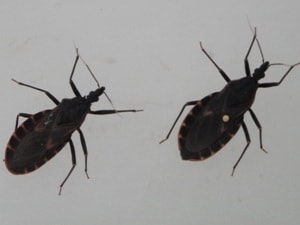Bed bugs have spread to 20 provinces and cities.
On June 20, Professor Vu Quang Con, Chairman of the Vietnam Entomological Association, said that currently, the nest of blood-sucking bed bugs has spread to 20 provinces and cities, especially large cities such as Hanoi, Da Nang, Ho Chi Minh City, and Hue.

| Image of a bed bug sucking human blood. (Source: Central Institute of Malaria and Parasitology). |
At the international conference on the current situation and epidemiological role of blood-sucking bugs in Vietnam held in Hanoi on June 20, Professor Con affirmed that in Vietnam, blood-sucking bugs have existed for a long time but were only discovered in 2011.
Speaking at the workshop, Mr. Tran Thanh Duong, Director of the Central Institute of Malaria - Parasitology - Entomology, said that in recent years, information about blood-sucking bugs has tended to spread and attack people in many places in Vietnam. In Hanoi alone, blood-sucking bugs have spread to 21 districts, causing many people to be afraid.
Presenting his research, Mr. Jean Pierre - Insect expert, French Institute for Development Research said: "When researching in Vietnam, I noticed the speed of spread of this stink bug species. Previously, it often appeared in coastal areas, but it is increasingly moving inland and developing rapidly in tropical regions."
"Meanwhile, in Latin America, a new epidemic called Chagas is spreading - a tropical disease transmitted by parasites into the human body. So, I am worried that with the appearance of this type of bug, the risk of spreading this epidemic in Vietnam is likely to happen through tourism," expert Jean Pierre worried.
According to Professor Kun, the blood-sucking bug is the culprit that causes parasitic diseases in Latin America. This epidemic then spread out of this region many centuries ago and silently spread throughout the world.
“Up to now, scientists have not yet discovered the mechanism of disease transmission by bed bugs that suck human blood. Therefore, the question of whether this animal can transmit disease or not is still unknown,” Professor Con said.
Professor Con also said that bed bugs that suck human blood cause heart rhythm disorders, blood vessel disorders, and health exhaustion. But whether or not they transmit diseases needs to be studied, because scientists have not yet found the mechanism of disease transmission by bed bugs that suck human blood. Besides, people and many scientists still have little knowledge about this type of parasite.
Therefore, according to Mr. Duong, the workshop with the participation of many medical experts from Asia, Europe, and Latin America is an opportunity for leading experts on insects around the world to discuss the current status of growth and spread of this insect species.
Through in-depth, scientific analysis by experienced experts, domestic and international delegates will focus on discussing strengthening research capacity on the role of disease transmission; methods of identifying blood-sucking bugs and parasites; and strategies for preventing blood-sucking bugs.
Also at the workshop, entomology experts advised people not to scratch when bitten by stink bugs to avoid infection and swelling. If the stink bug bite is swollen and accompanied by a fever, people should go to the doctor for treatment. People should pay attention to cleaning their living areas to prevent stink bugs from nesting and spreading.
The workshop is an activity within the framework of the French-Vietnamese Year 2013, jointly organized by the French Institute for Development Research (IRD), the Central Institute of Malaria - Parasitology - Entomology, and the Institute of Ecology and Environmental Resources./.
According to Vietnam+ - TH






